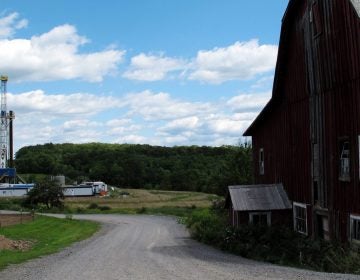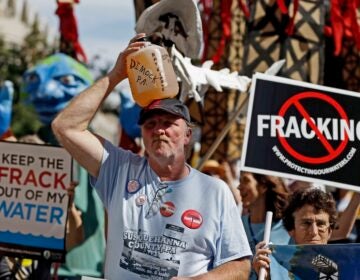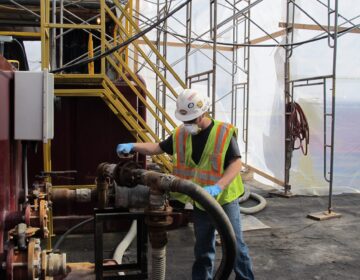Pa. grand jury report on fracking: DEP failed to protect public health
Grand jury makes proposals on regulation, oversight of fracking industry
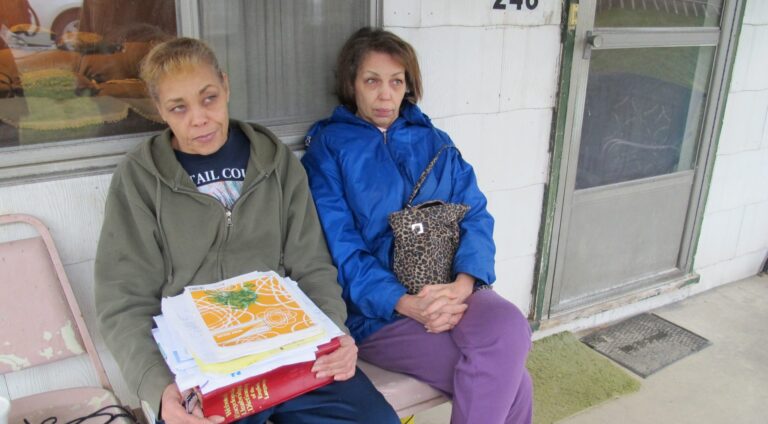
Jeanie Moten with her sister on their mother's porch in Rea, Pa. She holds a stack of medical records. The Motens say they received no help from DOH regarding their fracking health complaints. A case file released by the DOH through a Right-To-Know request confirmed that. (Susan Phillips / StateImpactPA)
This story originally appeared on StateImpact Pennsylvania.
A Pennsylvania grand jury report two years in the making slammed the Department of Environmental Protection for failing to protect the public from the health effects of fracking.
Pennsylvania Attorney General Josh Shapiro, who sent investigators across the state to investigate the industry, announced the findings at a press conference Thursday in Harrisburg. The grand jury said the risk of fracking should fall on the industry and on regulators but DEP “did not take sufficient action in response to the fracking boom.”
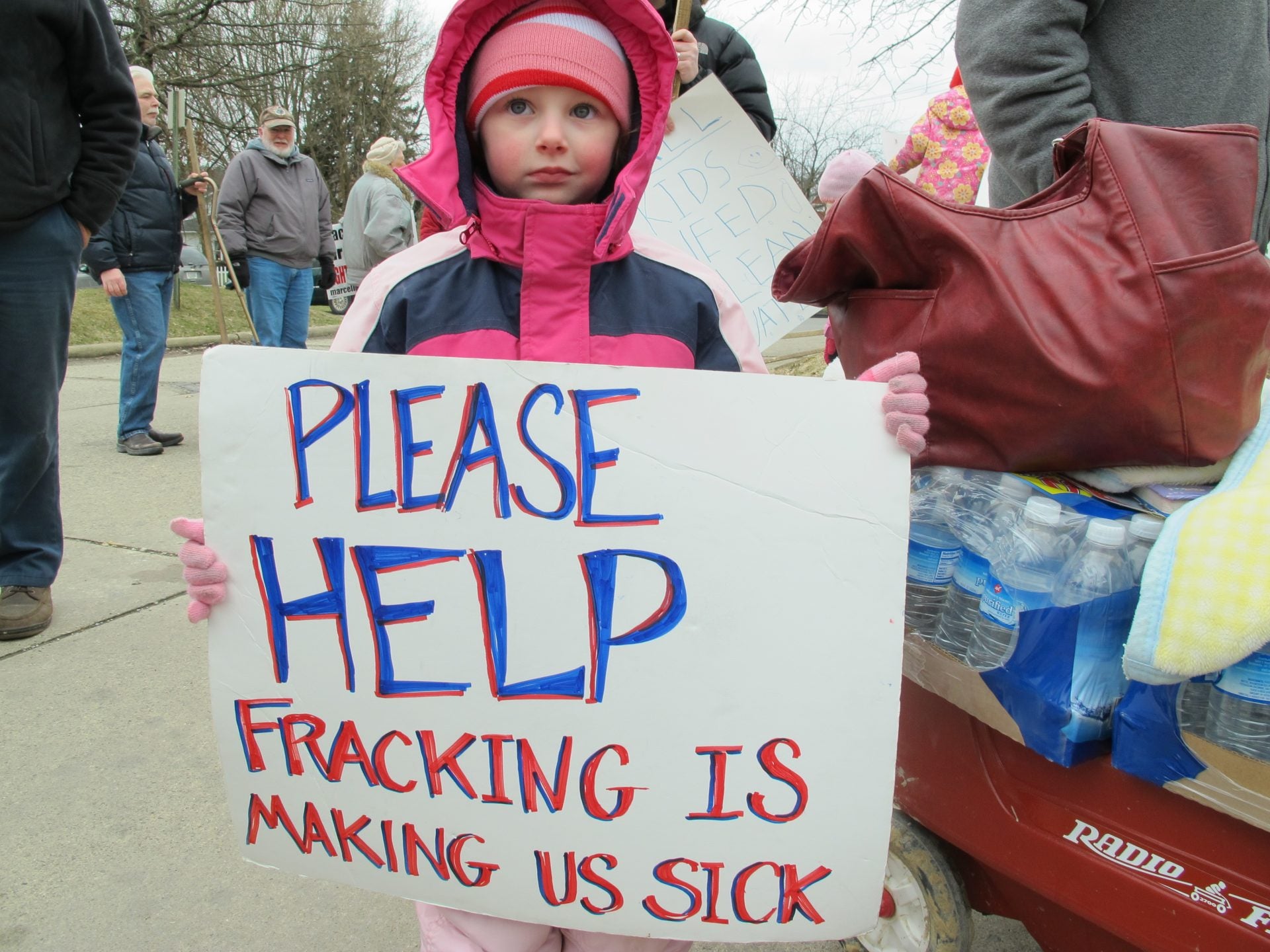
“It’s the government’s job to set and enforce the ground rules that protect the public interest,” Shapiro said. “Through multiple administrations, they failed.”
At one point, Shapiro held up a jar of brown well water that he said came from a resident whose water had been contaminated. He told stories of testimony from residents who complained of dead livestock, nausea, headaches and nosebleeds.
“The grand jurors heard repeated testimony of small children waking up with severe nosebleeds. One parent testified that her 4-year-old daughter was waking up crying with blood pouring out of her nose,” Shapiro said.
In one case, a resident saw how a nearby drilling operation polluted a waterway, watching the water “change colors.” He filmed the incident and contacted DEP. But Shapiro says rather than investigate and hold the company accountable, the resident was threatened with “filing a false report.”
The grand jury concluded the DEP’s responses to such problems amounted to sending the message: “Leave fracking alone.”
“Sadly, too many DEP employees listened,” Shapiro said. And the agency’s leadership, he said, is “too cozy” with the industry.
A spokesman for DEP put the blame on the administration of former Gov. Tom Corbett, a Republican who followed Democratic Gov. Ed Rendell, and who presided over the beginning of the state’s fracking boom. Rendell ushered in the Marcellus Shale development with enthusiasm. But the real gas rush began under Corbett, who served as governor for one term between 2011-2015. His handling of shale gas drilling was controversial, and used by current Gov. Tom Wolf as part of his campaign to oust Corbett.
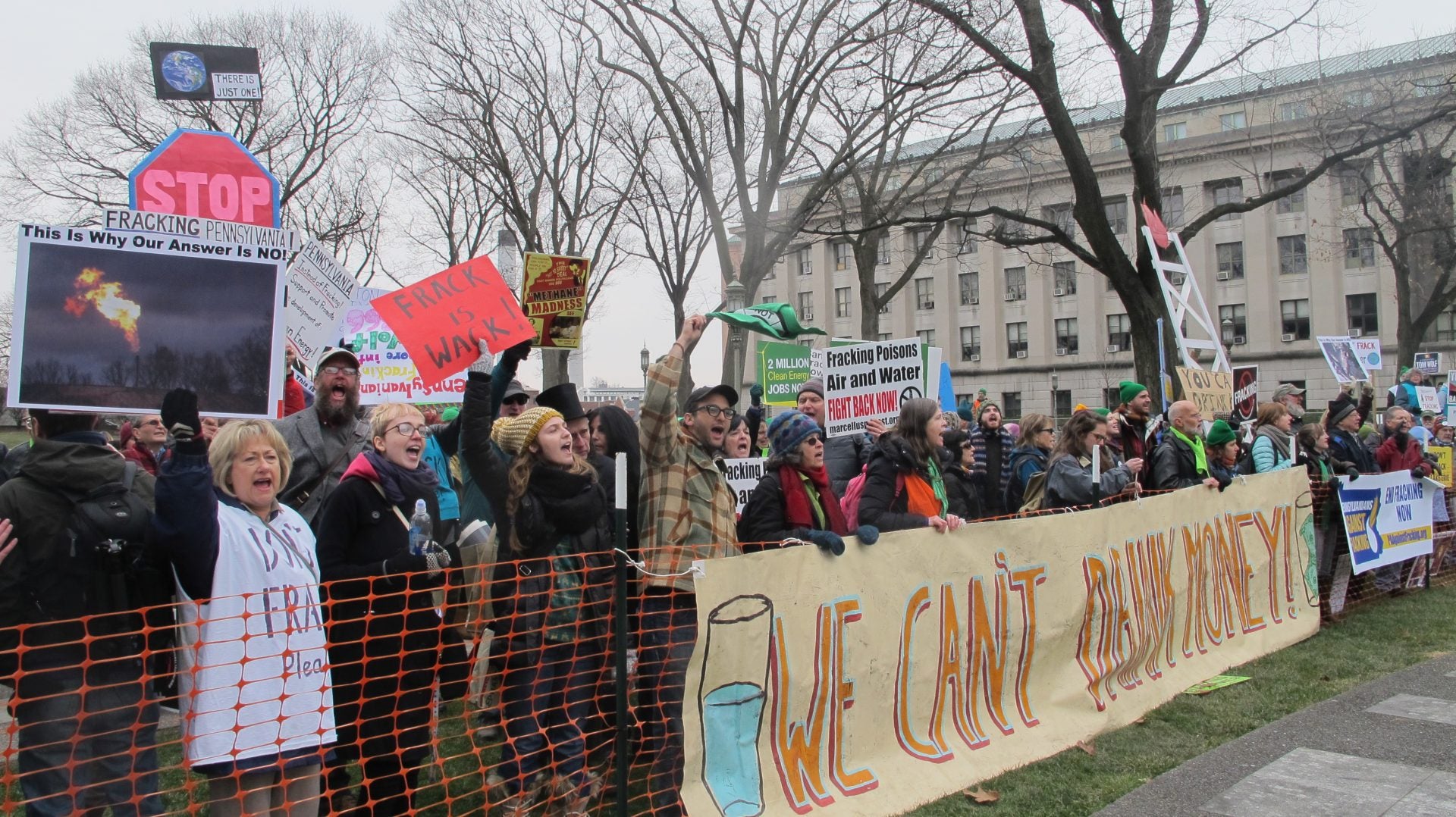
In this 2015 file photo, people demonstrate against fracking at Gov. Tom Wolf’s inauguration. Eight people were arrested, but charges were later dismissed. (Marie Cusick / StateImpact Pennsylvania)“The Wolf Administration inherited a flawed ideological approach to regulation of unconventional oil and gas development that was forced on the departments of Environmental Protection and Health by the Corbett Administration, which promoted the rapid expansion of natural gas development and profit above these other priorities,” the DEP spokesman said in statement.
Wolf promised greater reforms and oversight of the fracking industry, including a severance tax, but for many environmentalists, he fell short.
The report, however, does not criticize Gov. Wolf directly despite his oversight of both DEP and DOH.
The Wolf administration says since coming into office, the DEP vastly increased the number of well inspections and citations, and has fined drilling companies more than $67.5 million for environmental violations.
While the public relations arm of the Wolf administration put the blame on the Corbett administration, the administration’s attorneys lambasted the report itself.
In written comments responding to the report, the DEP called the report “unreliable” and “inaccurate” because it “relies upon unidentified witness snapshots, in some cases from 10-15 years ago.” The department argues that it’s modernized regulations over the industry and that it has made gas drilling safer.
Shapiro seemed taken aback by DEP attorney’s response to the report, which claimed the health impacts were “not significant.”
“That’s the words not of the fracking companies, but from DEP, the people that are supposed to be working for you,” said Shapiro. “Respectfully, that attitude is part of the problem that we are facing in Pennsylvania.”
But Shapiro stopped short of laying any blame on Gov. Wolf.
In written testimony included in the report, Scott Perry, the head of DEP’s Oil and Gas division, disputed some of the grand jury’s assertions.
In 2018, the agency considered including a question about health data on oil and gas complaints. According to the report, Perry opposed the question being included on a complaint form, believing it was a “leading question.” But Perry said in his response that it was a Department of Health Deputy Secretary who had initially objected to the question, and had been the first to label it a “leading question.” Instead of making the health data a mandatory question, the forms were developed to include a box for health effects if a resident mentioned health complaints unprompted.

In an emailed statement, Marcellus Shale President Dave Spigelmyer said the drilling industry’s “proactive and collaborative approach to ensuring Pennsylvania’s regulations encourage safety is unfortunately not reflected in this report.”
He said Pennsylvania’s gas drilling regulations have been strengthened over the years. Those include emissions rules on new oil and gas wells implemented by the Wolf administration.
“For anyone to suggest that we are not protecting our environment and public health while responsibly and safely producing clean and abundant American natural gas (they) should better understand the facts and science behind natural gas energy development,” Spigelmyer said.
The grand jury report also criticized the Department of Health as being “unable to meet the challenge” of understanding how the chemical-intensive process of fracking could affect human health.
Healthcare workers and activists had been seeking greater involvement from the health department for more than a decade. They had asked for regular data collection and a fracking health assessment. In 2014, StateImpact Pennsylvania broke the story of how the DOH instructed employees not to return residents’ calls if they reported fracking health complaints. The grand jury report said the DOH agreed with its assessment.
“Understanding of the health impacts of fracking is a major problem because the DOH failed to collect the data and do their jobs,” Shapiro said. “After 16 years and multiple gubernatorial administrations, it is unacceptable that the official answer is inconclusive.”
But in his news conference, Shapiro focused on the DEP, saying that even though it has gotten better during the Wolf administration, it let the fracking industry get away with too much. He recounted testimony heard by the grand jury, for example, from people who said they got sick from water contaminated by drilling activity.
“Regulators were supposed to prevent abuse by big corporations, and level the playing field,” he said. “But they didn’t.”
From the report
The report outlined the testimony of more than 70 families across the Pennsylvania who had experience with the natural gas industry as it was built out across the state. The residents testified to a litany of harms: truck traffic that coated windows with dust, well drilling that changed the color and smell of their water, around-the-clock fracking that kept some residents up all night, and waste impoundments that “smelled like gasoline and kerosene” and “would overwhelm homeowners with nausea, dizziness, and a feeling that they would pass out.”
“The common theme from every homeowner who testified before us was an all-encompassing, debilitating anxiety that comes from so many unknowns,” especially in the earliest days of fracking, the grand jury reported.
The grand jury called the current 500-foot setback for wells from buildings “woefully inadequate.”
The report found the DEP, through miscommunication, poor training, or undue deference to the gas industry, was unprepared to regulate the industry during the first few years of the gas rush. The department failed to notify neighbors when a nearby well was contaminated, or abruptly closed water quality complaint cases based on lack of evidence.
“DEP employees would investigate citizen complaints simply by calling the operator and asking him what happened. ‘We had so many complaints,’ testified one employee. It was impossible for us to respond to every one.’ So, instead, the first step was often to telephone the well site operator. If the operator sent in a photo purporting to show that no spill had occurred, the matter could be closed without ever leaving the office.”
The report also outlines political pressure at the agency to allow gas drilling to proceed. This included testimony from two former (unnamed) DEP secretaries, both of whom “felt that the oil and gas industry had its own pipeline to elected officials, and both felt pressure to permit production of shale gas.”
Regarding testimony from DOH employees, one public health nurse from Fayette County testified she had been given a list of 15 to 20 fracking-related words. If a caller mentioned any of them to her or her colleagues, “they could not answer any of the caller’s questions. Rather, they were to take the caller’s name and information and pass it on to a supervisor.” Another former health department official testified that any oil and gas related calls were forwarded to the agency’s bureau of epidemiology in Harrisburg, “into a proverbial ‘black hole,’” the report states.
Environmental groups praised the report. Food & Water Watch, in a statement, used the report to call for a ban on fracking.
PennFuture President and CEO Jacquelyn Bonomo said in a statement she was “hopeful” the grand jury’s recommendations would be taken up by the state.
“State leaders need to hold the industry responsible while moving our economy aggressively away to more sustainable, family-sustaining industries,” Bonomo said.
Grand jury recommendations
In making several recommendations to make the industry safer, the grand jury said, “We heard clear and convincing evidence that leads us to conclude that industry operations in Pennsylvania have made our children sick. “
He said the grand jury is making several recommendations to fix what it says went wrong during the state’s fracking boom over the last decade:
- Increase the set-back of all oil and gas wells from 500 to 2500 feet from any home or business, and more for schools and hospitals.
- Make public the chemicals used in the fracking process
- Make the transportation of toxic waste safer
- Regulate smaller pipelines, or gathering pipelines “based on risk, not size”
- Strengthen air pollution regulations of fracking-related sites
- Assess public health in relation to fracking (the DOH has agreed to do so, Shapiro said)
- Slow the “revolving door” by limiting the ability of legislators and state employees to leave public service and go to work for the industry
Shapiro said that DEP “has proven unable or unwilling” to refer criminal cases to the AG’s office, which cannot take up an investigation without a referral. At the news conference, he said his office has set up a phone line and an email address people can use to alert his office to fracking- or wastewater-related problems.
People can call 570-904-2643 or email fracking@attorneygeneral.gov.
Criminal charges filed earlier against two drillers
The grand jury worked for two years, Shapiro said, and developed criminal presentments against two drilling companies, Range Resources and Cabot Oil and Gas. And “there will be more to come,” he said.
Earlier this month, Range Resources pleaded no contest to environmental crimes at two Washington County sites.
As part of its plea, the company agreed to pay $150,000 for charges stemming from leaks and spills at the sites. At one of them, the Brownlee site, a storage tank leaked 2,000 gallons of fracking waste into a field and nearby creek in 2018. A second location, known as the Yeager site, was at the center of a high-profile contamination case that ended in a legal settlement.
In both cases, Shapiro said, the company hid its internal knowledge of contamination from nearby residents and the public, and was negligent in protecting the state’s environment.
At the Brownlee site, the company reported the leak to a nearby landowner, “but not what damage had been done to the property,” Shapiro said, in a statement.
The leak contaminated soil on a nearby farm and required the removal of about 100 trees and 12,000 square feet of soil. Range removed the contaminated trees and soil, but replanted the property only after the homeowner “said he would contact the media” about it, according to a grand jury presentment.
The case of the Yeager site was the subject of the 2019 book “Amity and Prosperity,” by journalist Eliza Griswold, which was awarded the 2019 Pulitzer Prize in general nonfiction.
Range developed the site beginning in 2009 to handle the fracking wastewater and solid waste from nearby drilling sites.
According to a grand jury presentment, there were tears in the liner of the impoundment, and numerous spills around the site. More than once, the wastewater in the impoundment became septic — overrun with bacteria — causing bad odors which the company treated with “toxic” chemicals. The company continued to use the site, the investigation found, even after two Range employees, Carla Suszkowski and Glenn Truzzi found evidence that the impoundment was contaminating nearby groundwater.
The company closed the impoundment in 2014, after reaching a consent agreement with the DEP.
The leaks and spills formed the heart of a legal case in which three families sued the company. The families alleged the site made them sick, including nose bleeds, headaches, dizziness, extreme fatigue, and skin rashes.
The suit also alleged Range Resources and two contracted laboratories committed fraud and conspiracy by manipulating test results to obscure their findings from the plaintiffs.
Range and several other companies involved with the site denied wrongdoing and fought the lawsuit in court for six years. The two sides eventually settled in 2018 for $3 million.
By then, Shapiro’s office had begun investigating oil and gas companies for possible environmental crimes. The office sent a letter to attorneys in the case stating it had “assumed jurisdiction over several criminal investigations involving environmental crimes in Washington County” and that “one of the potential criminal investigations involves your respective clients.”
Correction: The original version of this story listed the incorrect area code for the AG’s hotline. It has been corrected.

Get daily updates from WHYY News!
WHYY is your source for fact-based, in-depth journalism and information. As a nonprofit organization, we rely on financial support from readers like you. Please give today.


